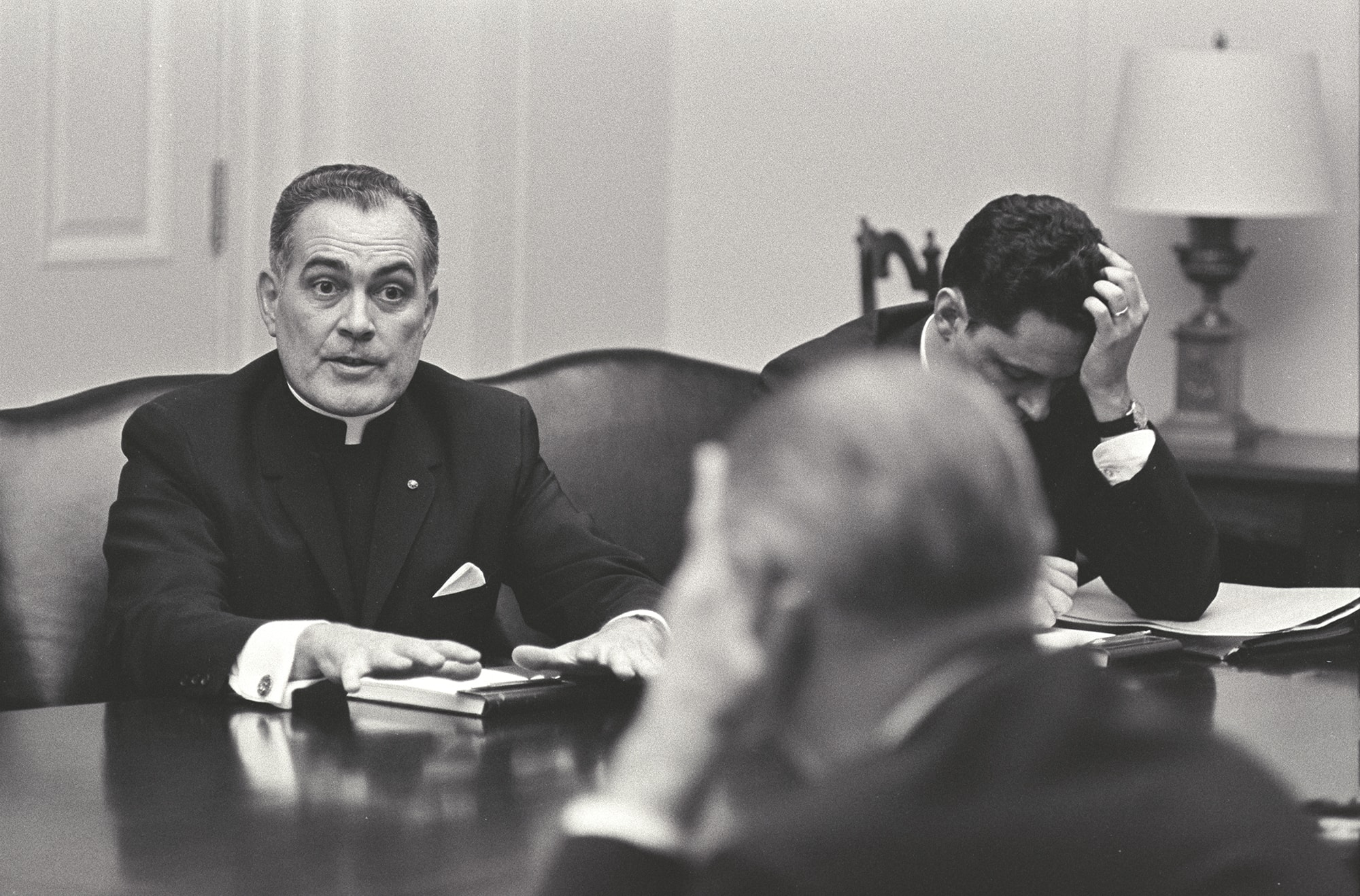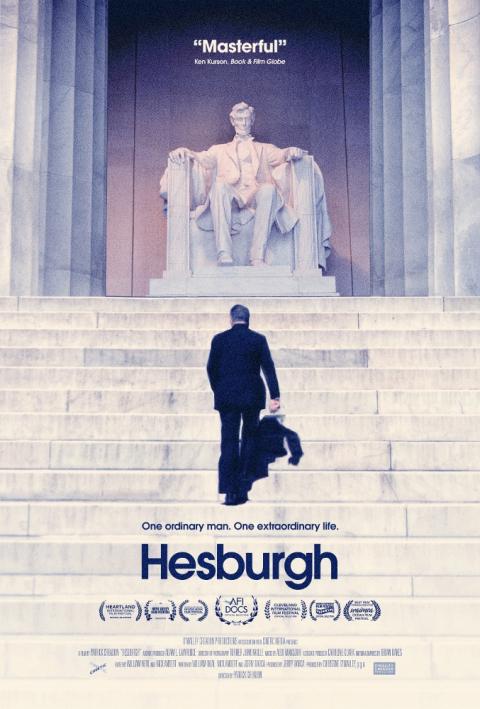
Holy Cross Fr. Theodore Hesburgh during his tenure as chair of the U.S. Civil Rights Commission (OCP Media)
Director Patrick Creadon's new documentary, "Hesburgh," named for its compelling subject, the cigar-smoking Holy Cross Fr. Theodore Martin Hesburgh, is a sweeping biography of a man whose towering influence in American life continues to be felt today.
From the age of six, Hesburgh wanted to be a priest. Born in 1917 in Syracuse, New York, the second of five children, he was educated in Catholic schools. In 1934, he began his studies for the priesthood at the Holy Cross seminary at Notre Dame University in South Bend, Indiana, at the time an all-male institution. After ordination, he continued his education and served in various pastoral capacities. Hesburgh wanted to become a U.S. Navy chaplain but instead was sent to teach in the religion department at Notre Dame in 1945. In 1952, at the age of 35, he was named president of the university where he would serve for 35 years.
The film is a fascinating biographical documentary. As expected, there are many interviews, news clips and photographs that are skillfully spliced together. The narration, inspired by Hesburgh's own writings and recordings, is provided by Maurice LaMarche, a Canadian voice actor. His measured, matter-of-fact tone is very similar to Hesburgh's own. As I watched, I felt drawn in completely and the time passed quickly. I can say this about very, very few films.
Hesburgh was the man for so many moments spanning the mid-20th century. Notre Dame was known for its football program when he took over. He realized that to meet the needs of the times the university's academics would have to excel, too. He was an extraordinarily gifted fundraiser. Marty Ogren, his longtime driver, tells of the time Hesburgh opened a letter and showed him a check for $5 million. Notre Dame became co-educational in 1972 and he never wavered in his efforts to make it one of the top schools in the country. He diversified the Board of Trustees, replacing most priest members with businessmen, including the first Jewish member, Newt Minow, a former head of the FCC.
Advertisement
Hesburgh raised the bar for higher education in the United States, especially for how Catholic colleges and universities would encounter the ideas and realities of the modern world. He was a key figure in the development of the controversial 1967 Land O'Lakes Statement articulating the autonomy of Catholic universities to assure academic freedom. He was convinced that open dialogue between people who held radically opposing views was necessary for an authentic and relevant education. He notably invited Alabama Gov. George C. Wallace, with whom he clashed over segregation, to speak at Notre Dame. Despite pressure on and off campus, the university continues Hesburgh's legacy of dialogue by inviting speakers whose views challenge Catholic beliefs and morals such as President Barack Obama.
When it came to academic freedom, Hesburgh was entirely devoted to the church, but he would not let it stand in the way of education. From his first years at Notre Dame he had to consider how to balance faith and academics and he believed that it was up to the university to call the shots. He ran into a conflict with Vatican authorities in 1954 when the University of Notre Dame Press published a book based on a symposium, The Catholic Church and World Affairs, that included a paper on church and state by Jesuit Fr. John Courtney Murray, who was soon to be silenced by the Vatican for some years, but would go on to make a significant contribution during the Second Vatican Council.
Cardinal Alfredo Ottaviani (at the time pro-secretary of the Holy Office, now called the Congregation for the Doctrine of the Faith) wrote to the Holy Cross superior general and demanded that the book be withdrawn from circulation. When Hesburgh refused, Ottaviani succeeded by pressuring the Jesuit superior general and a second edition was never published. As Vincentian Fr. Anthony Dosen wrote in his book Catholic Higher Education in the 1960s, Hesburg believed that "Catholic universities, in order to be true universities, need to responsibly exercise their inquiry without fear of interference from outside sources, be they secular or ecclesiastical."

(OCP Media)
Hesburgh was a counselor to presidents such as Dwight D. Eisenhower and Bill Clinton, and received many presidential appointments, the most notable of which was by Eisenhower to the U.S. Civil Rights Commission in 1957. He went on to chair the commission from 1969-1972 until Richard Nixon asked for his resignation over disagreements on voting rights legislation among other issues. Hesburgh is especially remembered for getting members of the commission to overlook profound differences and bond on a fishing trip. The commission made the recommendations so Lyndon Johnson could finally sign the Civil Rights Act in 1964. At a Martin Luther King Jr. civil rights rally in 1964 in Chicago, Hesburgh gave an unplanned speech and joined hands with King and supporters, singing "We Shall Overcome."
As for racial integration at Notre Dame, Hesburgh and the students knew there was a stark lack of diversity on campus despite the priest's role on the Civil Rights Commission. This bothered him and his students and they reflected on how to address problem. His solution was to remove the 30-year ban on Notre Dame playing in post-season bowl games and earmark the revenue for minority scholarships. Director Creadon told me in an interview, "Fr. Hesburgh was a good, creative, patient and kind problem solver, and this was a most elegant solution."
While Father Ted, as he was known on campus, was for civil rights for all Americans and was in favor of allowing students to peacefully protest the war in Vietnam, he drew the line at violence and protests that disrupted students' learning. To face this problem, he instituted the 15-minute rule. Students could protest peacefully but if they were asked to stop or disband, they had 15 minutes to do it or be suspended. After another five they would be expelled. When the CIA and Dow Chemical were recruiting on campus, several students lay down in front of the office preventing interviews from taking place. Because Hesburgh believed that the interview process was part of the students' education and was being interrupted, he invoked the rule.

At a civil rights rally in 1964 in Chicago, Hesburgh gave an unplanned speech and joined hands with King and supporters, singing "We Shall Overcome."
I spoke to the film's director about this because at first glance it seemed inconsistent for Hesburgh to be this drastic regarding freedom of expression, given his civil rights record and attitude toward education. Creadon said that no college president wanted violence on their campuses during that era and considering the times, he believes Hesburgh's rule was reasonable. After the film wrapped, his team discovered that several students were expelled (more than the five reported in the newspaper shown in the film) and that shortly after the event, the University's administration quietly reached out to all of the students and invited them to continue their education at Notre Dame the next semester. Some of the students returned, some did not.
Creadon also told me that Hesburgh was an anti-communist, that he respected the military and was a patriot. But then U.S. forces invaded Cambodia in April 1970. The same weekend that four students were killed at Kent State University by the National Guard in early May 1970, Hesburgh came out definitively against the war in Vietnam. To further integrate his view about protests and the war, Hesburgh said that violence on campus was the worst way to protest.
For Father Ted, who traveled extensively during his entire presidency at the university, Notre Dame was always home. His primary identity was always as a priest, something his long-time good friend newspaper advice columnist Ann Landers (Eppie Lederer), always respected about him. He was beloved by his students and accessible to them when he was on campus. He told his students: "Always do the right thing."
The many people interviewed in the film include Hesburgh's brother, Jim, current president of Notre Dame Holy Cross Fr. John. J. Jenkins, former Secretary of Defense Leon Panetta, Speaker of the House Nancy Pelosi, Notre Dame grad and journalist Sam Robert Anson (who tells an incredible story of Hesburgh asking for Pope Paul VI's help to have Anson released from capture by the North Vietnamese when on assignment for Time in 1970), NCR columnist Michael Sean Winters and NCR executive editor Tom Roberts.
"Hesburgh" records for posterity the history of the Catholic Church in America and its interaction with U.S. history and culture during the tumultuous years of Hesburgh's tenure. As the film notes, it is a picture of Notre Dame University as a "lighthouse of the Catholic faith at the crossroads of culture, civility, hospitality and love." As for the relevance of a film, Creadon told me that this is the seventh film he and producer Christine O'Malley have made together in 14 years.
"We decided that this was the time for us to finally make the film we wanted to make. I am so proud of Father Ted and his leadership and the kind of hero he was. His story provides a moment of reflection for us to consider that this is what a life well-lived looks like," he said.
"The film is also a great starting point for anyone who is going to vote in 2020," Creadon added. "Fr. Theodore Hesburgh's life and example can help us imagine what good leadership, what a different kind of leadership in our country would look like."
[Sr. Rose Pacatte, a member of the Daughters of St. Paul, is founding director of the Pauline Center for Media Studies in Los Angeles. She is an award-winning film critic whose work appears in NCR.]








